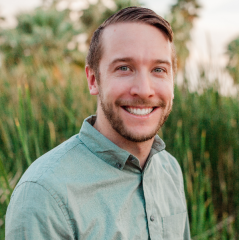ASU students travel from Tempe to Narnia and beyond

CEL 494 Politics & Literature will explore C. S. Lewis’s works and thoughts.
For almost 75 years, C. S. Lewis’ series of novels “The Chronicles of Narnia” have helped parents tuck their children in at night, inspired by mythical beasts, talking animals and fantastic adventures.
Since their original publication, between 1950 and 1956, the books sold over 100 million copies in more than 47 languages and were adapted to radio, TV and film. In addition to “The Chronicles of Narnia,” Lewis' other, lesser-known novels also touch on a range of themes that invite readers of all ages to reflect on life, ethics, civics and religion.
In the spring 2023 course Politics & Literature, offered by the School of Civic and Economic Thought and Leadership, Arizona State University undergraduate students will participate in open debates about Lewis' thoughts on politics, civic life and the human condition through a selection of his thought-provoking fiction and nonfiction works.
The course will be taught by Assistant Professor Zachary German during Session C, from 1:30 to 2:45 p.m., Tuesdays and Thursdays, on the Tempe campus, and will fulfill the upper division literacy and critical inquiry (L) general studies requirement that all students need for graduation.
Here, German answers some questions about the course and what students can expect.
Zachary German
Question: Which works by Lewis will students read in this course?
Answer: We will spend most of the semester going “beyond Narnia,” so to speak, encountering a selection of Lewis’ most significant fiction and nonfiction works. Some of the readings include “The Abolition of Man,” “The Four Loves,” “The Screwtape Letters” and “That Hideous Strength.”
Q: What type of classroom experience should they expect from this course?
A: This course will be discussion-based, and our goal will be to build a learning community in which we seek to gain insight together into Lewis’ work and what we might learn from it. The more that students invest themselves in the readings, and the more that they are willing to share their ideas and questions during class, the better the exchange of ideas that we will have.
Q: What inspired you to develop a course to examine the intersections of politics and literature, and why focus on C. S. Lewis?
A: The study of politics and literature is intriguing because literature offers a distinctive way of thinking about timeless questions of politics, civic life and the human condition. A political treatise or essay is likely to make claims about what’s true, right, good or just, supporting those claims with reason and evidence. In contrast, a literary work — at least a certain kind of literary work — tells a story that sparks the imagination. It invites us to ponder what the story and its characters might reveal about reality, even though the characters and events may be fictional, and even though the story may take place in a very different world from our own. I was interested in a course on Lewis, specifically, both because Lewis’ fictional works are engaging and thought-provoking, and because we are able to combine the study of those texts with an examination of some of his nonfiction works in this course.
Literature offers a distinctive way of thinking about timeless questions of politics, civic life and the human condition.
– Assistant Professor Zachary German
Q: Why should students majoring in political science, for example, consider taking this course?
A: I think we may have a perhaps overly strict conception of what it means to study politics, of how one should approach thinking or learning about politics, and of what is relevant to thinking about politics. In this course, by studying Lewis’ fiction and nonfiction work, students of politics will be encouraged to have a more capacious notion of what is worth reading, considering and discussing in an effort to grapple with political questions.
Q: Why should students majoring in religious studies and philosophy consider taking this course?
A: Lewis is so widely known today not only because of “The Chronicles of Narnia,” but also because he has been particularly influential as someone who wrote on religious and philosophical topics in a way that is accessible to a broad audience. Students of religious studies and philosophy will have an opportunity to become more familiar with the work of this significant thinker, as well as to explore the connections between religion, philosophy and civic life in his thought.
Q: What will students majoring in liberal arts learn from this course that will help them interpret Lewis’ work differently?
A: Depending on our intellectual interests and our academic training, we are likely to have different types of questions arise when we engage with a text. The questions that we ask about a book end up shaping what we take away from it. In this course, we will focus on fundamental, timeless questions of civic life and human life more broadly – questions that have political, philosophical, moral and religious dimensions.
More Law, journalism and politics

A new twist on fantasy sports brought on by ASU ties
A new fantasy sports gaming app is taking traditional fantasy sports and mixing them with a strategic, territory-based twist.…

'Politics Beyond the Aisle' series to explore the stories of public officials
In an effort to build a stronger connection between students and political and civic leaders, Arizona State University’s School…

ASU committed to advancing free speech
A core pillar of democracy and our concept as a nation has always been freedom — that includes freedom of speech. But what does…


